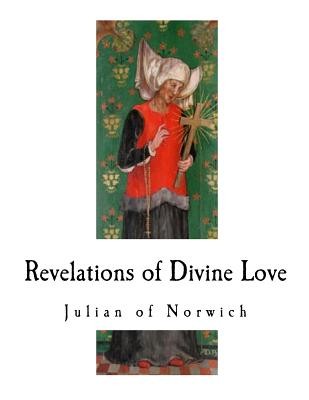
- We will send in 10–14 business days.
- Author: Julian of Norwich
- Publisher: CreateSpace Independent Publishing Platform
- Year: 2018
- Pages: 138
- ISBN-10: 1718743289
- ISBN-13: 9781718743281
- Format: 21.6 x 28 x 0.8 cm, minkšti viršeliai
- Language: English
- SAVE -10% with code: EXTRA
Reviews
Description
Revelations of Divine Love: A 14th-Century Book of Christian Mystical Devotions. Recorded by Julian of Norwich. The Revelations of Divine Love is a 14th-century book of Christian mystical devotions written by Julian of Norwich. It includes her sixteen mystical visions and contemplations on universal love and hope in a time of plague, religious schism, uprisings and war. Published in 1395, it is the first published book in the English language to be written by a woman. At the age of thirty, 13 May 1373, Julian was struck with a serious illness. As she prayed and prepared for death, she received a series of sixteen visions on the Passion of Christ and the Virgin Mary. Saved from the brink of death, Julian of Norwich dedicated her life to solitary prayer and the contemplation of the visions she had received. She wrote a short account of her visions probably soon after the event. About twenty or thirty years after her illness, near the end of the fourteenth century, she wrote down her visions and her understanding of them. Whereas Latin was the language of religion in her day, Julian of Norwich wrote in a straightforward Middle English, perhaps because she had no other medium in which to express herself (she describes herself as a simple creature unlettered, Rev. chap. 2). Unfortunately the original manuscript no longer exists in any known archive. This English book exists in two Manuscripts: No. 30 of the Bibliotheque Nationale, Paris (Bibliotheca Bigotiana, 388), and No. 2499 Sloane, in the British Museum.
- Author: Julian of Norwich
- Publisher: CreateSpace Independent Publishing Platform
- Year: 2018
- Pages: 138
- ISBN-10: 1718743289
- ISBN-13: 9781718743281
- Format: 21.6 x 28 x 0.8 cm, minkšti viršeliai
- Language: English English
Revelations of Divine Love: A 14th-Century Book of Christian Mystical Devotions. Recorded by Julian of Norwich. The Revelations of Divine Love is a 14th-century book of Christian mystical devotions written by Julian of Norwich. It includes her sixteen mystical visions and contemplations on universal love and hope in a time of plague, religious schism, uprisings and war. Published in 1395, it is the first published book in the English language to be written by a woman. At the age of thirty, 13 May 1373, Julian was struck with a serious illness. As she prayed and prepared for death, she received a series of sixteen visions on the Passion of Christ and the Virgin Mary. Saved from the brink of death, Julian of Norwich dedicated her life to solitary prayer and the contemplation of the visions she had received. She wrote a short account of her visions probably soon after the event. About twenty or thirty years after her illness, near the end of the fourteenth century, she wrote down her visions and her understanding of them. Whereas Latin was the language of religion in her day, Julian of Norwich wrote in a straightforward Middle English, perhaps because she had no other medium in which to express herself (she describes herself as a simple creature unlettered, Rev. chap. 2). Unfortunately the original manuscript no longer exists in any known archive. This English book exists in two Manuscripts: No. 30 of the Bibliotheque Nationale, Paris (Bibliotheca Bigotiana, 388), and No. 2499 Sloane, in the British Museum.


Reviews